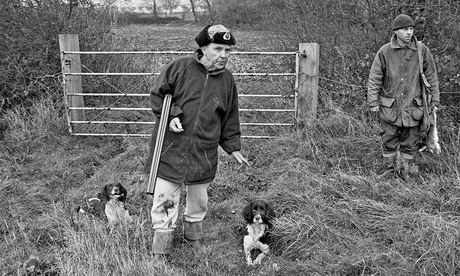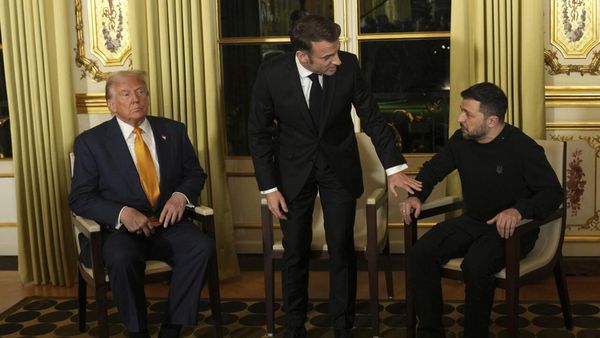
If you’ve ever wondered how to set hingles for hares and rabbits, how to catch pheasants with a slip snare or fish using four-pronged spears made from saplings, and above all, how to get away with it, then this is the book for you.
Bob and Brian Tovey, a father and son from Gloucestershire, may be the last English poachers of the book’s title but they are probably not the last English poachers. It is hard to tell: accurate statistics on their exact number – like the exact number of English badgers, deer and salmon – are not available. But Bob, who died in February, aged 76, as the book was going to press, and Brian are certainly part of an increasingly rare breed. The Last English Poachers is a kind of double memoir, consisting of alternating chapters in which the two men reminisce about their poaching lives and tell of their dastardly deeds of shotgun-toting derring-do.
Their story is not for the faint-hearted. It begins with Bob’s gripping account of shooting a stag on the Berkeley Estate. “After bleeding the beast, I open the carcass and gralloch it, which means dragging out the guts, and I leaves the pluck in the undergrowth for the scavengers. A stag is heavy enough to drag over a distance, without pulling the insides along, too.” Stag guts are not the only thing that get left behind in the story: for all his proud plain speaking Bob is rather coy about his personal life. We get to know more about his relationship with his first greyhound, Queenie, than we do about his relationship with his first wife, who left him because he was – by his own admission – a horribly violent alcoholic.
Having grown up roaming the fields and woods of south Gloucestershire, it was perhaps inevitable that Bob would not get on well in the navy. After joining at 16, he proceeded to get into fights, kicking one officer in the head and knocking his teeth out. The only thing Bob seems to have learned at sea was how to drink 20 pints. He was dishonourably discharged and returned home, where he kept on drinking, fighting and became a professional poacher.
Bob is clear about the appeal of poaching. “It’s a man alone, in hostile territory, with a dog or a gun – a man agin’ the elements, agin’ the keepers, again’ the law. Can’t you feel it? The rawness of it, the adrenaline pumping, the heart beating ... It’s a true kind of freedom, to be doing what’s in your nature to do since the dawn of time.” You might not approve of Bob’s chosen profession, but frankly he doesn’t give “a fiddler’s feck” what you think.
Brian is clearly a great admirer of his no-nonsense father, though he does concede that Bob was “generally a nasty violent individual” and a chronic alcoholic. Nonetheless, he “could feel my father in my blood and, in my ears, the sound of him pounding through my veins, trying to get out and evaporate and fall like red rain on a West Country field”. In other words, if you prick Brian, he bleeds Bob.
Expelled from school, Brian became a professional poacher, too, and if anything he turned out even angrier, more violent and bitter than his father. Where Bob’s chapters tend towards poacher’s lore and whimsy, Brian’s chapters tend towards rant and diatribe. “To me, poaching means more than killing wild animals for food; it’s an inclusive way of life that incorporates conservation and a dislike, bordering on hatred, of the ruling elite.” Brian is dismissive of the “brainwashed minds of the masses, with the middle-classes living in their comfort and conceit and the others either side of them on the social ladder misled as well”. He particularly dislikes “cap-tippers and shit-kickers and saddle-bumpers and lords and ladies and bishops and bigwigs and ponces”. Oh, and cats. Brian absolutely hates cats. “A lot of townie people who’ve moved into the village have cats and they might not appreciate me killing their little moggies, but I hate the things; they’re horrible buggers, killing just for fun, not out of necessity, and I’ll shoot them any chance I get. Sometimes I catch them in cage traps that I’ve set for a fox or a badger. If that happens, I’ll kill them and chuck them in the ditch, so it looks like they’ve been hit by a car.” Brian dislikes cats because they kill for fun. So he kills them, for fun. Logic is not his forte.
Neither is he much good at staying out of prison. Bob’s boast is that “I was never convicted of a crime in all my days as a poacher, apart from being fined a fiver once, and I never will be now. They tried to do me many times, but I was always too clever for ‘em and one step ahead.” Brian, on the other hand, boasts of having been jailed three times for “poaching and pinching”.
Bob gets away with his lovable old rogue act but Brian’s bile and braggadocio are hard to swallow. Sometimes he sounds like Adrian Mole – commuters have no place in the countryside, he argues, and are nothing more than “plastic people, bought people” – but more often he just sounds confused. He roundly condemns “self-righteous buggers”, those “who never look inside themselves to see their own little flaws and failures as they pass subjective judgments on those who, in their ignorant and misguided minds, they consider to be wrongdoers”. But he goes easier on his friends, such as Cider Chris, who hit a nine-year old girl in his car while out drunk-driving, and is blind to his own flaws, such as his tendency to cheat, steal, lie, double-cross and cause others injury or harm. Having absconded overnight from an open prison, for example, he manages to return and blame the escape on another inmate who gets transferred to a closed prison for the rest of his sentence. “I said nothing,” boasts Brian. Sometimes it would be good if Brian said something that wasn’t purely self‑serving, ignorant or offensive.
Nonetheless, for all the bluster, The Last English Poachers is a raw and vivid picture of what Bob calls “this bear-baiting bastard of a world” and does much to dispel romantic notions of the poaching life. It’s not all about pinching a few rabbits for the pot, obviously. There are also the endless TV appearances, the netting of hares for Eton College and the supplying of them to, in Brian’s words, “some Arab Abdullah” for use in falconry. Would you believe it, poaching is not some innocent, rustic, ancient way of life: it’s a business.
- To order a copy of The Last English Poachers for £12.99 go to bookshop.theguardian.com.







